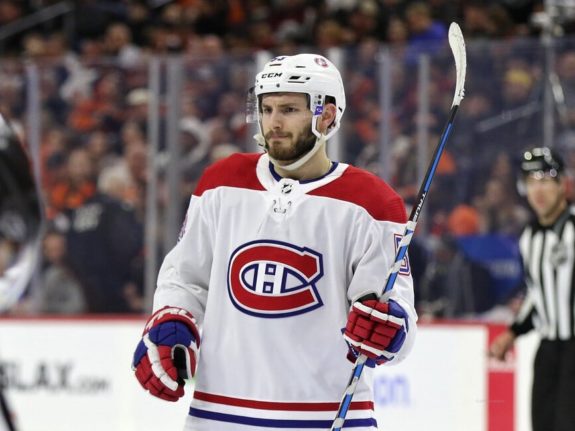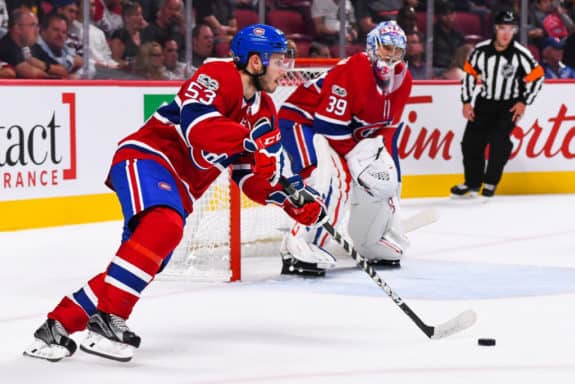When Victor Mete first joined the Montreal Canadiens in his 2017-18 rookie season, there was as much intrigue as excitement in seeing him play. A fourth-round selection in 2016, he joined the professional leagues after only one more year of junior hockey at 19 years of age. Additionally, he began playing on the Canadiens’ top defence pairing with Shea Weber. It was quite the jump for him back then.
Quite impressive considering his draft position but understandable considering the Canadiens’ lack of depth on left defence at the time. Because of this, Mete was able to play a respectable number of minutes with different veterans on the team. Also, since the Canadiens did not send forth a playoff-calibre team, he played with a longer leash than many young defencemen would historically in Montreal. He was also able to go back temporarily to junior to win the gold medal at the 2018 IIHF World Junior Championship, avoiding too much time sitting in the press box.
Now in his third season, we are getting closer to an indication of what Mete’s true potential may be. As he finally scored his first career goal earlier this season, he is finally seeing the point production he was lacking the two seasons prior. With that as well as his growing confidence, he will continue to be an important part of the Canadiens’ youth movement. Only 21 years of age, he has plenty of value, giving the Canadiens plenty of options.
Time for a New Contract
With his entry-level contract expiring this season, preliminary talks for an extension have begun. Although Mete has started this season strong, the Canadiens could be unconvinced that he will remain a first-pairing defenceman. His camp may negotiate that due to the responsibility he has taken on by being on Weber’s left, he deserves more compensation in his next contract than his statistics demonstrate at face value.
If Mete’s camp will truly wait until the end of the season to get into serious negotiations, it would definitely benefit the player more as this season is shaping up to be his best. That means the more comfort he gains, the better he will continue to be and the higher his value becomes. The question becomes whether he settles for a shorter bridge deal or secures himself better with a long-term deal.
What would his annual value be for both situations? The Canadiens have the advantage in deciding what they want because a player’s production holds a great amount of weight. Mete is quite the unique case as not many defencemen in the league took until their third season to score their first career goal. Finding a comparable is difficult.
Although his path at the time was very different than Mete’s, Matt Bartkowski took 137 games to score his first goal — 10 more games than it took Mete. Bartkowski ended that season with six goals in 80 games. He then signed a two-year deal at a minuscule $612,500 per season. Given Mete’s importance to the Canadiens, that deal would obviously be way underneath his current value. A bridge deal with an average annual value around $2 million might be more appropriate.

Another possible comparable could be Jonas Brodin, if we consider a long-term contract. Although Brodin had scored more goals, his point totals and his responsibility for the Minnesota Wild matched closely with Mete’s at the time of signing his second contract. Both players played with top-four defenceman responsibilities and both are known for moving the puck well but have closer to average shots.
Brodin signed a six-year deal at a cap hit percentage of 6.04 after his entry-level deal expired. If Mete and the Canadiens sign a contract to a similar length, that percentage might work well. That would result in an approximate $4.9 million per year contract. This seems high now, but if he improves more over the next year or two, we could consider this a bargain.
A Valuable Trade Asset
Another option, whether he re-signs with the Canadiens or not, is to trade him this season or in the future. Mete has become a fan-favourite in Montreal, so it may be difficult for some to imagine him changing teams. However, he could be a valuable trade piece the Canadiens must consider to improve the team. If the team wants to trade for a top-six forward or a top-pairing defenceman, he can be the core of a package deal.

For example, if the Canadiens target Taylor Hall with a high chance of extending his contract, would the New Jersey Devils consider a package of Mete, Cayden Primeau and a first-round draft selection? Or if the Canadiens aim to upgrade the left side of the defence, could Mete, a prospect and a draft pick help the team acquire a player like Shayne Gostisbehere or Cam Fowler?
The Canadiens should not label a single player on the team as untouchable. There could be many high-end players available in the next few years and the team should not hesitate to consider moving anyone they consider to be a part of their core. Past Stanley Cup contenders have been unafraid to make difficult decisions such as trading a young promising player, so the Canadiens should not be either.